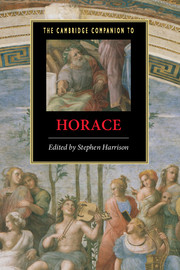Book contents
- Frontmatter
- Introduction
- Part 1: Orientations
- Part 2: Poetic Genres
- Part 3: Poetic Themes
- Part 4: Receptions
- 20 Ancient receptions of Horace
- 21 The reception of Horace in the Middle Ages
- 22 The reception of Horace in the Renaissance
- 23 The reception of Horace in the seventeenth and eighteenth centuries
- 24 The reception of Horace in the nineteenth and twentieth centuries
- Dateline of works and major political events
- Works cited
- Index
24 - The reception of Horace in the nineteenth and twentieth centuries
from Part 4: - Receptions
Published online by Cambridge University Press: 28 May 2007
- Frontmatter
- Introduction
- Part 1: Orientations
- Part 2: Poetic Genres
- Part 3: Poetic Themes
- Part 4: Receptions
- 20 Ancient receptions of Horace
- 21 The reception of Horace in the Middle Ages
- 22 The reception of Horace in the Renaissance
- 23 The reception of Horace in the seventeenth and eighteenth centuries
- 24 The reception of Horace in the nineteenth and twentieth centuries
- Dateline of works and major political events
- Works cited
- Index
Summary
This chapter looks at the literary reception of Horace in poetry in English (primarily but not exclusively produced in the United Kingdom) in the nineteenth and twentieth centuries, and the early years of the twenty-first. It does not treat the use of Horace’s verse in literary prose texts, or discuss scholarly work on the poet in these periods.
From the Romantics to the Victorians
Horace was popular among both general and scholarly readers in Victorian England. The centrality of Horace to the curriculum of the newly influential elite English 'public' (private) schools was clearly one root cause of this popularity, along with the reception and construction of Horace as an honorary English gentleman who represented the values of the male Victorian English elite. Horace was not a new element in English culture; he had been important in the eighteenth century, and though the Romantics might revolt against the tyranny of being taught Horace at school, they still admired him, a tension which comes out well in Byron’s famous lines (Childe Harold Canto iv (1818) 77), motivated by the sight of Soracte in Italy and consequent recall of Odes 1.9: 'Then farewell Horace, whom I hated so, / Not for thy faults, but mine.'
- Type
- Chapter
- Information
- The Cambridge Companion to Horace , pp. 334 - 346Publisher: Cambridge University PressPrint publication year: 2007
- 3
- Cited by



